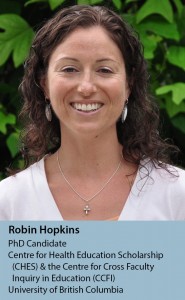Robin Hopkins
Topic: The implications of integrating basic and clinical sciences in medical education

Date: Wednesday, February 19, 2014
Time: 12:00pm to 1:30pm (Lunch will be served at DHCC)
Locations:
- Diamond Health Care Centre 2267
- IRC 305
- MSB 107
- KGH 237
- NHSC 9-374
- Surrey Central City (Manning Room)
Abstract
The predominant structure of medical education is the “2+2” curriculum: students spend 2 years learning basic sciences and 2 years in clinical training. Students’ difficulty transferring knowledge from classrooms to practical settings has driven efforts to integrate basic and clinical sciences. Such efforts, however, have led to little change in curricula. Some related challenges may be situated in the struggles of individual educators dealing with change. This presentation discusses a phenomenological study of the experiences of basic science educators as they transition to an integrated curriculum.
Biography
Robin Hopkins is a PhD candidate at the Centre for Health Education Scholarship (CHES) and the Centre for Cross Faculty Inquiry in Education (CCFI). In addition, she teaches in the anatomy lab for the MD Undergraduate Program at UBC. Prior to starting her PhD at CHES, Robin was the research assistant for curriculum renewal. She completed a BSc in Kinesiology at SFU, and practiced as a kinesiologist at Dale Charles Physiotherapy Clinic in Penticton, BC. Robin continued her studies in education, completing the Professional Development Program at SFU. She gained international teaching experience as part of the International Teachers Education Module where she taught senior biology at a high school in Trinidad. Returning to Vancouver she taught for both School Districts 43 (Coquitlam) and 42 (Maple Ridge/Pitt Meadows). Robin also completed a MSc in Clinical Anatomy at the University of Western Ontario.
Accreditation:
As an organization accredited to sponsor continuing medical education for physicians by the Committee on Accreditation of Canadian Medical Schools (CACMS), the UBC Division of Continuing Professional Development designates this educational program as meeting the accreditation criteria of the College of Family Physicians of Canada for up to 1.5 Mainpro-M1 credits (per session). This program has been reviewed and approved by UBC Division of Continuing Professional Development. Each physician should claim only those credits he/she actually spent in the activity.
Accreditation Statement:
The CHES Research Rounds is a self-approved group learning activity (Section 1) as defined by the Maintenance of Certification program of the Royal College of Physicians and Surgeons of Canada.
